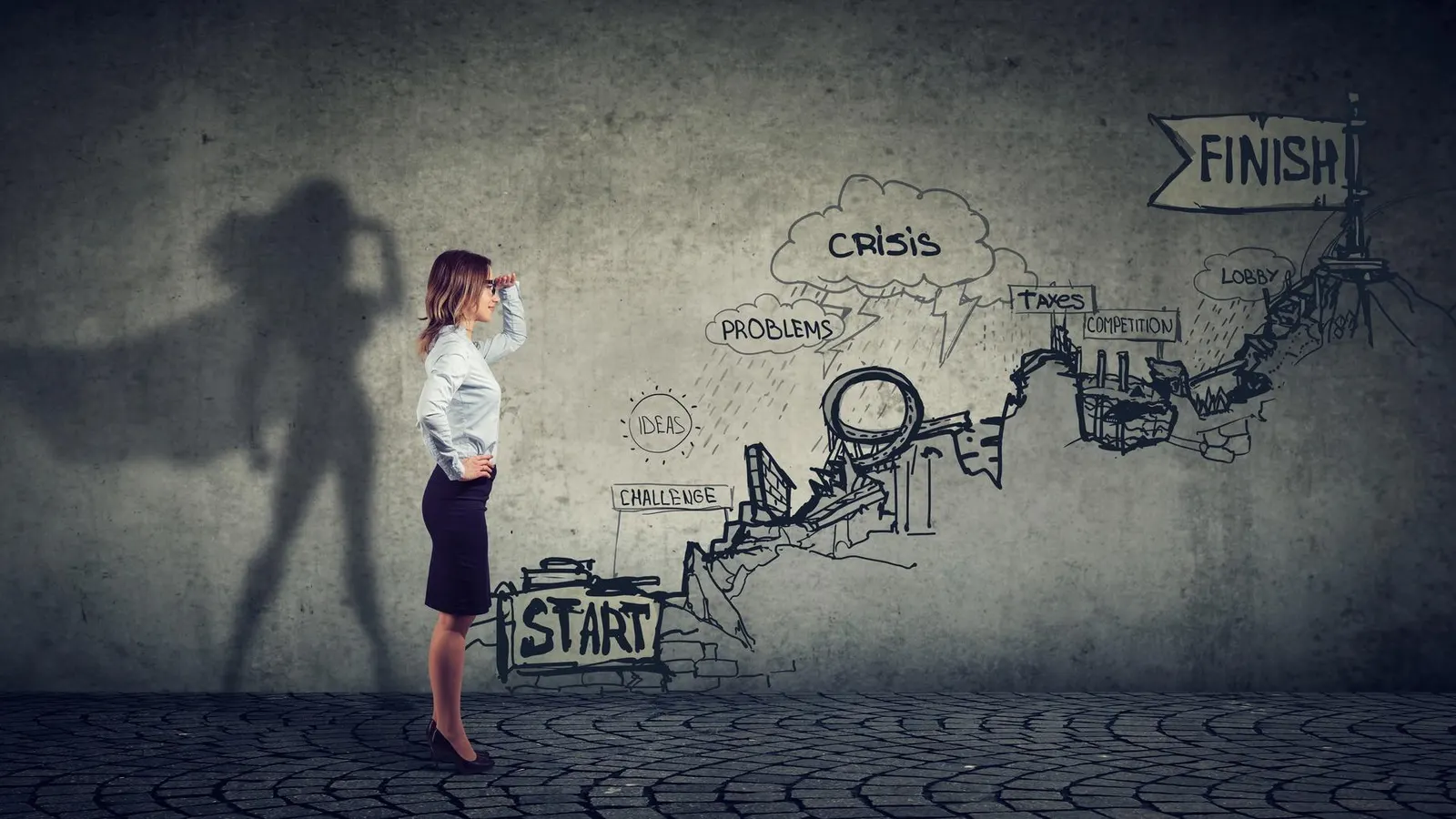
Fixing Your Inner Self to Succeed in Business
Unless you believe in yourself how will others believe in you? How will you sell your services and products effectively?
Understanding what is holding us back to succeed
In life, fear can be a powerful force that holds us back from reaching our full potential and achieving our goals. It can manifest in many forms, such as fear of failure, fear of rejection, fear of the unknown, and fear of change.
These fears can stem from past experiences or traumas, societal and cultural conditioning, or a lack of self-confidence. They can stop us from taking risks and trying new things, or hold back our true selves and opinions, and can limit our potential for growth and success. Fear can also lead to feelings of anxiety and depression, which can further hinder our ability to achieve our goals.
But how much has your fear and lack of confidence cost you in your life? How many years have you wasted? Not approaching the love of your life because you were shy. Opportunity cost and money lost in business. Wasting the best years of your life in an average job where you were not being properly utilized?
As an individual I was always very shy even up until my early 30’s. I was competitive, and I liked to excel in everything I did, but I was a shy and timid individual. When some professional opportunities came my way, I was forced to overcome my shyness and become stronger. Had I been more self-aware maybe I wouldn’t have wasted so much time in my life. Maybe I would have been more confident and more decisive.
Think about it……When you enter an unfamiliar environment or ponder a difficult decision, what do you feel? Do you second-guess yourself or agonize over what to do?
Confident people doubt themselves as well, but they enjoy a strong sense of security and trust their abilities.
Confidence affects every area of our life, including work and relationships. Many experiences can damage your confidence, but it’s worth making the effort to build it back up again; and get ready for life's experiences.
When we're confident, we're more likely to move forward with people and opportunities — not back away from them. And if things don't work out at first, confidence helps us try again and again.
Did you know that confidence works at a sub-conscious level?
And yet, it is a critical ingredient to succeed in your personal life, to start a business, to succeed in business, to make more money. But at University or even at school, were you ever taught how to become more confident?
Here are ten reasons why confidence matters:
#1 Having confidence can lead to improved health.
Confidence has been linked to better health and a longer lifespan. This may be attributed to the positive emotions, such as happiness, optimism, and satisfaction, associated with confidence. In contrast, individuals with low self-confidence may experience negative emotions like fear, depression, and anxiety, which can have detrimental effects on health.
#2 Confidence can keep you safe
Confidence enables individuals to make choices that align with their values and desires, rather than succumbing to risky or dangerous activities due to peer pressure. This is particularly prevalent among teenagers who are in the process of developing their self-confidence and sense of self, making them more susceptible to pressure from their peers. A lack of self-confidence can lead to individuals making poor decisions despite knowing it is not the right choice for them.
#3 Confidence helps you be more decisive
Lack of confidence can make decision-making difficult as it leads to self-doubt, second-guessing, and self-criticism. Confidence, on the other hand, allows for a clear perspective, providing a sense of security in your ability to make decisions and handle the outcome, whether it be positive or negative, with flexibility and adaptability.
#4 Confidence can aid in building resilience.
Confidence enables individuals to handle setbacks and failures in a constructive manner, as they trust in their abilities to overcome challenges. This helps to put failures in perspective and to not dwell on them. This ability to handle failures and challenges with a positive attitude and with resilience, in turn, further strengthens one's confidence.
#5 Confidence improves your relationships
Confidence plays a significant role in fostering positive relationships. Confident individuals possess a sense of self-assurance and self-worth, which allows them to be honest and genuine in their interactions with others. They are also less inclined to seek validation and approval from others, which leads to more satisfying and balanced relationships. Furthermore, confidence enables you to set and maintain healthy boundaries, making it less likely for you to tolerate disrespect or mistreatment from others.
#6 Confidence makes you a better communicator
Confidence plays a vital role in effective communication. Confident individuals can express themselves clearly and confidently. They can communicate their needs and wants making them less likely to struggle with misunderstandings, second-guessing or fear of rejection. On the other hand, individuals with low self-confidence may have difficulty communicating their needs and wants, which can lead to confusion and misunderstandings. Confidence ensures more straightforward and honest communication, fostering better understanding and relationships.
#7 Confidence earns you respect
Confidence is a key factor in earning respect from others. Confident individuals exude a sense of self-assurance and capability, making them appear trustworthy and relatable. This is why many of the world's most successful leaders across various fields possess confidence. However, it is important to note that confidence does not equate to arrogance. Confident individuals also earn respect by being open to other perspectives, addressing feedback constructively, and being aware of their own limitations.
#8 Confidence can assist in managing anxiety.
Anxiety is a normal feeling that everyone experiences at some point. Confidence can be a powerful tool in managing these feelings, particularly during challenging situations such as important meetings or difficult conversations. Confidence shields individuals from negative self-talk, such as "You can't do this" and instead provides a more positive and empowering message, "You can do this." This can help to reduce feelings of nervousness and uncertainty and empowers you to approach these situations with a sense of self-assurance.
#9 Confidence acts as a motivator
Confidence plays a crucial role in motivation as it allows individuals to believe in their capabilities and to work towards their goals and aspirations. It also helps individuals to draw on past achievements, no matter how small, as a source of inspiration for future endeavors. Confidence gives a sense of pride in past accomplishments and hope for future success. This mindset can be a powerful driving force in achieving your dreams and reaching success in all areas of your life.
#10 Confidence is closely related to self-esteem
While confidence and self-esteem are not mutually exclusive, they are linked. Confidence can help you build better self-esteem and vice versa. Knowing your value and what you bring to the table boosts your confidence, while confidence grounds you in who you are and what you’re capable of.
Learning about, mastering, and understanding the concept of confidence is vital as it can have a significant impact on all areas of your life. Confidence can affect your personal and professional relationships, communication, decision-making, resilience, and overall well-being. Understanding how confidence works and how to improve it can help you achieve greater success and satisfaction in your personal and professional life.
As Henry Ford said: “One of the greatest discoveries a man makes, one of his great surprises, is to find he can do what he was afraid he couldn’t do.”
With Confidence the Authentic You Will Shine Through.
What holds most of us back is the fact that we think we are not good enough. Yet, self-confidence is a learnable skill that can be mastered in life. You can train yourself to become more confident when you become more self-aware.
So before we embark in any course with the objective to succeed why don’t we learn how:
- To believe in ourselves
- To become more confident
- And then go and conquer our dreams.
One of my gurus Dan Lok suggests that to be successful in the long-term we need to align with the following three.
- Self-Image
- Self-Esteem and
- Self-Confidence
Self-image refers to the way I THINK. The mental picture or representation we have of ourself, including our physical characteristics, personality, and abilities. It encompasses the beliefs, attitudes, and perceptions we hold about ourselves, which can shape our behavior and actions. This can be influenced by a variety of factors such as past experiences, societal and cultural norms, and personal beliefs.
A positive self-image can lead to increased self-esteem and confidence, while a negative self-image can lead to low self-esteem and self-doubt.
The self-image can change over time, and can be impacted by internal and external factors such as personal development, feedback from others, and life events.
Self-esteem refers to the way I FEEL. Our overall sense of self-worth or personal value. It is the subjective evaluation of our own worth as a person, and is influenced by our self-perceptions and self-evaluations. High self-esteem is associated with a positive self-image and self-confidence, while low self-esteem is associated with negative self-image and self-doubt.
People with high self-esteem tend to have a more positive outlook in life and are more resilient to stress and negative feedback. Low self-esteem can lead to a variety of issues such as anxiety, depression, and relationship problems.
Yet most people have low self esteem because we are programmed, judged at a young age at school, from our parents from our environment who traumatized us, without realizing it. As a result this created a negative belief system that we are not good enough, which we carry through to our adult life. Most of us suffer from this, at a sub-conscious level without realizing it. Furthermore, the need to strive for perfection, which usually holds us back, coupled with the dangers of social comparison and the inherent negativity bias that we all carry often leads to the development of the imposter syndrome where we constantly doubt ourselves.
But there are many techniques that can help us re-program ourselves, once we become more self-aware.
Self Confidence is the way I ACT and what we believe about our abilities and skills. It refers to our belief in our own abilities, qualities, and judgments.
High self-confidence is associated with a positive self-image, self-esteem and the ability to trust ourself. Low self-confidence is associated with negative self-image, low self-esteem and self-doubt.
Self-confidence can fluctuate depending on the situation and can be influenced by a variety of internal and external factors such as past experiences, feedback from others, and personal beliefs. People with high self-confidence tend to have a more positive outlook on life, are more resilient to stress, and are more likely to take risks and pursue their goals. Low self-confidence can lead to a variety of issues such as anxiety, depression, and difficulty in personal and professional life.
Building self-confidence can be achieved through positive self-talk, learning new skills, setting and achieving realistic goals, and seeking support from others.
So, is feeling good, enough to help us succeed in our life?
As Dan Lok states: “Only when you have congruence in thoughts, feelings, actions then you will create the life you want”.
To overcome fear and move forward, it can be helpful to identify the specific fears that are holding us back, and to work on addressing and overcoming them through therapy, self-reflection, and building resilience. It can also be helpful to surround ourselves with supportive people and to practice positive self-talk and visualization.








